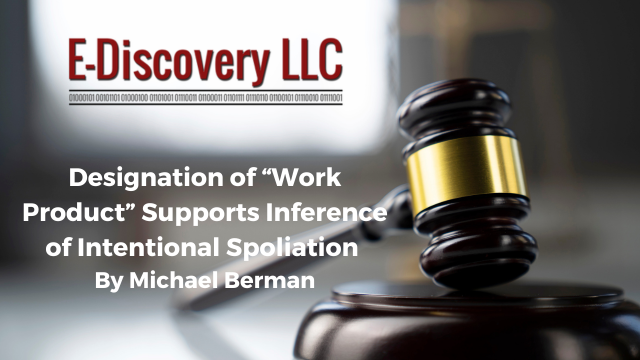
[EDRM Editor’s Note: The opinions and positions are those of Michael Berman.]
In Stuart v. County of Riverside, 2024 WL 3086634 (C.D. Cal. Jun 14, 2024), the assertion of work product protection in a privilege log supported an inference that the subsequent deletion of ESI was done with a culpable state of mind.
“Work product” protection begins when material is prepared in anticipation of litigation. The duty to preserve is triggered when litigation is reasonably anticipated.
Because the date of a work product designation must be disclosed on a privilege log, it can also be used by an opponent on a motion for sanctions if potentially responsive information was not preserved after the date of the work product designation.
Michael Berman, Owner, E-Discovery LLC.
Stuart involved a spoliation motion. Plaintiff contended that the defendant County had re-imaged a defendant’s laptop with the intent to deprive others of using that information in violation of Fed.R.Civ.P. 37(e). The County conceded that generally it anticipated litigation but asserted that it had not specifically anticipated this litigation.
The Stuart court wrote:
Even if such an exception could be conceived, however, the metadata contained on Coronel’s computer would necessarily be relevant to litigation related to her access of Plaintiffs’ information. Without engaging in speculation about the motives of any particular County employee, the Court concludes that the County’s claim of the work product protection over a month before it permanently deleted the metadata on Coronel’s computer supports an inference of the County’s culpable state of mind. See Compass Bank v. Morris Cerullo World Evangelism, 104 F. Supp. 3d 1040, 1056–57 (S.D. Cal. 2015). As a result, the Court will give an adverse inference instruction to the jury; the exact content of this instruction will be determined during the jury instruction conference.
Stuart v. County of Riverside, 2024 WL 3086634 at *3 (C.D. Cal. Jun 14, 2024).
The basic syllogism is that, when a potential party marks information as work product, it does so in anticipation of litigation. The duty to preserve is triggered by the reasonable anticipation of litigation. If the two standards are not identical, they are sufficiently similar so that marking information as “work product” admits that the duty to preserve has been triggered. Because the date of a work product designation must be disclosed on a privilege log, it can also be used by an opponent on a motion for sanctions if potentially responsive information was not preserved after the date of the work product designation.
The argument has both supporting authority and critics. See, e.g., Robert D. Owen and Melissa L. Fox, The Triggers for Work Product Protection and the Duty to Preserve Are Not Identical – Lexology (Nov. 15, 2017).
As a result, caution is in order.


